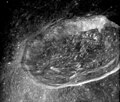
Al-Khwarizmi is a lunar impact crater located on the far side of the Moon. It lies to the southeast of the crater Moiseev, and northeast of Saenger.

Fizeau is a prominent lunar impact crater that is located on the far side of the Moon, in the southern hemisphere. Nearby craters of note include Minkowski to the west-northwest, and Eijkman to the southwest.

Boole is a lunar impact crater that lies along the northwestern limb of the Moon, to the northwest of the crater Gerard. At this location it is viewed nearly from the side, and is very oblong in shape due to foreshortening. The crater formation is nearly circular, however, with a wide inner wall that has been worn and rounded due to subsequent impacts. It is named after George Boole.

Brianchon is a lunar impact crater that is located along the northwestern limb of the Moon. Due to its location, from the Earth the crater is seen from the edge and its visibility is somewhat affected by libration. Thus for a more detailed view, the crater must be viewed from orbit.

Lemaître is a lunar impact crater that is located on the southern hemisphere on the far side of the Moon. It lies to the south of the older crater Minkowski, and north of Crommelin. To the east-southeast lies the crater Eijkman.
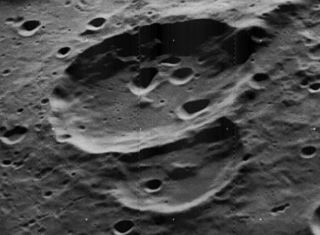
Chaffee is a lunar impact crater that is located in the southern hemisphere on the far side of the Moon. It lies within the huge walled plain Apollo, and is one of several craters in that formation named for astronauts and people associated with the Apollo program. This basin is a double-ringed formation, and the crater Chaffee is situated across the southwest part of the inner ring. The ridge from this ring extends northward from the northern rim of Chaffee.

Dryden is a lunar impact crater that is located on the southern hemisphere on the far side of the Moon. It lies within the huge walled plain called Apollo, and is one of several features within that basin named after people associated with the Apollo program. Apollo itself has an inner ring, and Dryden is attached to the west-northwest part of that circular mountain formation. To the south of Dryden along the same range is the crater Chaffee.
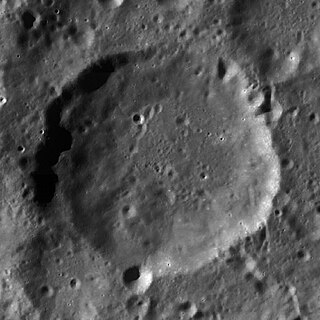
Clark is a lunar impact crater that lies in the southern hemisphere of the Moon's far side. It is located midway between the larger walled plain Van der Waals to the south and the similar-sized crater Pizzetti to the north. It is named for American astronomer and telescope maker Alvan Clark and his son Alvan Graham Clark.

Carver is a lunar impact crater that is located on the far side of the Moon, due east of the walled plain Van der Waals. To the northeast is the crater Rosseland, and to the south-southeast lies Kozyrev.

Dyson is a lunar impact crater, 63 kilometers in diameter, that lies on the far side of the Moon, past the northwest limb. It is located in the northern part of the surface, to the northwest of the crater Coulomb, and east of van't Hoff.

Donner is a lunar impact crater on the far side of the Moon. It is located just to the northeast of the Mare Australe, behind the southeastern limb of the Moon. During favorable librations this part of the lunar surface can be brought into view of the Earth, but the site is viewed from the edge and so not much detail can be seen.
Eijkman is a lunar impact crater that is located on the far side of the Moon's southern hemisphere. It lies about a half crater diameter to the southeast of the larger crater Lemaître. To the south-southwest is the crater Crommelin, and to the northeast is Fizeau.

Frost is a lunar impact crater that is attached to the southern rim of the walled plain Landau, and lies on the far side of the Moon. Just to the east is Petropavlovskiy, and to the northeast along the edge of Landau is Razumov. The crater Douglass is located less than a crater diameter to the west-southwest.
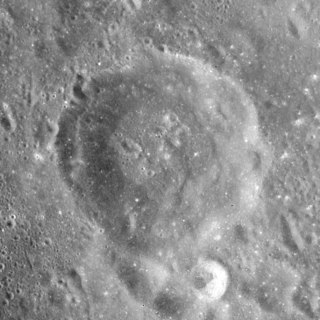
Ganskiy is a lunar impact crater that is located on the far side of the Moon. It lies to the southeast of the walled plain Hirayama.

Hippocrates is a lunar impact crater on the far side of the Moon. It is located in the northern region of the lunar surface, to the north of the crater Stebbins. To the southwest of Hippocrates are Kirkwood and the large Sommerfeld.

Paracelsus is an impact crater on the Moon's far side. It is located to the east of the crater Barbier, and to the southwest of the large walled plain Vertregt. To the south is the Mare Ingenii, one of the few lunar maria on the far side.

Marconi is a lunar impact crater that is located on the Moon's far side. It lies to the northwest of the large walled plain Gagarin, and to the southwest of the prominent crater Chaplygin. To the west-northwest of Marconi is the slightly larger Dellinger.

Roche is a large crater on the far side of the Moon from the Earth. The prominent crater Pauli lies across the southern rim of Roche, and the outer rampart of Pauli covers a portion of Roche's interior floor. To the north-northwest of Roche is the crater Eötvös, and just to the west-northwest lies Rosseland.

Stein is an elongated impact crater formation that lies just to the east of the larger crater Tiselius, on the far side of the Moon. Farther to the east-southeast of Stein lies Krasovskiy.
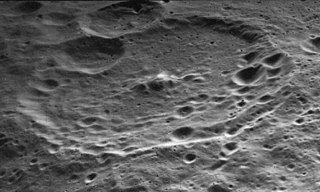
Schuster is a lunar impact crater that lies along the eastern rim of the much larger walled plain Mendeleev, on the far side of the Moon. To the east of Schuster is the crater Henderson, and to the southeast lies the large Chaplygin.




